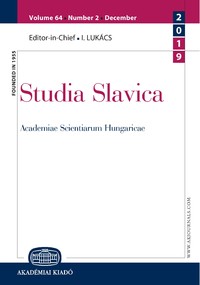Об изменениях в лексике русской лирической поэзии
On Changes in the Vocabulary of Russian Lyric Poetry
Author(s): Mihály PéterSubject(s): Russian Literature, Eastern Slavic Languages
Published by: Akadémiai Kiadó
Keywords: styles of language and poetic speech; approach of the poetic vocabulary to colloquial language in Russian lyric poetry; extracts from the poetry of Lomonosov; Derzhavin; Zhukovsky; Nekrasov; Blok
Summary/Abstract: The paper intends to present the general tendency of lexical change in Russian lyrical po- etry during the last two hundred years on some arbitrarily selected examples. The odes of Lomonosov were accomplished in the lofty style based on Slavonic, rhetorical, and other “poetical” devices. In Derzhavin’s ode Felica, enthusiastic and ironical elements, pathos and everyday talk are combined. In Zhukovski’s romantic poetry the objective sense of words is overshadowed by their emotive overtones. In avoiding the grandiloquent romantic lexis, Nekrasov describes the hopeless hard life of Russian peasantry with deep sympathy, and reliably reproduces the popular speech. In the cited poem of Akhmatova, the psychic drama of the heroine is expressed by a peculiar connection of words belonging to different stylistic layers. The entirely prosaic lexis and syntax of Blok’s short poem suggests the poet’s feeling about the hopeless immobility of life in a condensed metaphoric shape. Vino- kurov’s poem relates an imagined accidental meeting of former lovers after thirty years of their separating in an entirely colloquial style. Since a poem of genuine aesthetic value appears as a complex artistic work, its components mutually strengthen, supplement, or compensate each other. Thus, the increase of colloquial elements in the poetic vocabulary does not necessarily indicate a process of “depoetization”.
Journal: Studia Slavica Academiae Scientiarum Hungaricae
- Issue Year: 64/2019
- Issue No: 2
- Page Range: 397-407
- Page Count: 11
- Language: Russian

